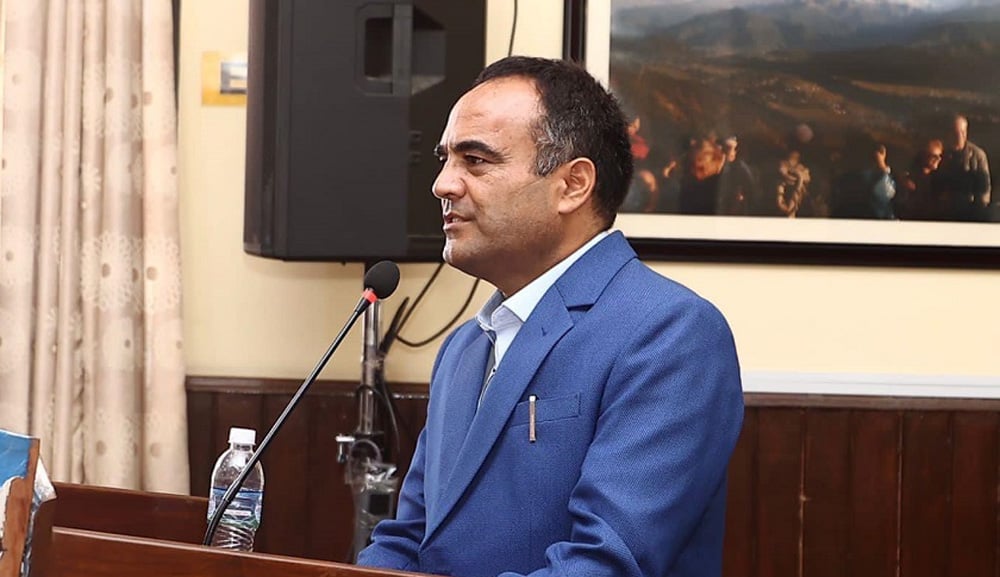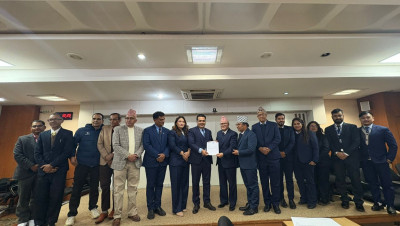Minimum Wage Is Just ‘Paper Justice’: Nain Singh Mahar

Kathmandu, July 18 – Influential central member of the Nepali Congress and head of its Education Department, Nain Singh Mahar, has termed the recently increased minimum wage for workers as mere “paper justice,” arguing that it cannot bridge the wide gap between workers' real living standards and the brutal inflation in the market. He criticized the ad-hoc approach of simply increasing numbers without a scientific basis, stating that such methods fail to provide meaningful relief to workers.
Speaking at a discussion program titled "BP's Socialism and Today’s Congress" organized by the Academic Dialogue Group in Kathmandu, Mahar raised serious concerns about the new wage set through agreement between the government, employers, and certain trade unions.
"Although the newly implemented wage of NPR 19,550 from Shrawan 1 (July 17) appears slightly progressive on the surface, it does not reflect the true worth of workers’ sweat. It seems like bargaining over the tears caused by inflation,” Mahar remarked emotionally. “This increment may provide slight relief in the kitchen, but it cannot address rising costs in children’s education, family healthcare, or even basic future dreams."
Gap Between 'Cost of Living' and 'Minimum Wage'
Mahar, also a strong general secretary candidate in the Nepali Congress's 15th General Convention, accused the government of ignoring the concept of “cost of living” necessary for a dignified life, despite fulfilling the legal formalities around setting a minimum wage.
“According to basic economic principles, wages must at least cover food, shelter, education, healthcare, and basic social needs,” he said. “Various studies show that a family of four needs NPR 30,000 to 35,000 per month to survive with basic dignity in cities including Kathmandu. In that context, how can a wage of 19,550 be called scientific or just?” He clearly stated that this raise cannot lift workers above the poverty line.
Inflation Has Already Devoured the Increment
Analyzing market trends of the past two years, Mahar argued that the roughly 13% wage increase has already been swallowed by real inflation. “Even before this increment reaches the worker’s hand, the skyrocketing market prices and double-digit inflation have already consumed it,” he added. “This does not increase the declining purchasing power of workers — in fact, even maintaining the status quo will be a struggle.”
BP’s Socialism and the Question of Productivity
Connecting with the theme of the event, Mahar said that BP Koirala’s vision of socialism was not just about statistics but also about the dignity of every worker and the poor. “In BP’s envisioned socialism, a worker is not merely a means of production, but a respected stakeholder in the economy,” said Mahar. “Insufficient wages breed frustration and kill motivation among workers, which directly affects national productivity. Fair wages are not an expense, but the most powerful investment to keep the economy moving.”
He demanded that the government end the ad-hoc system of wage determination and instead develop a scientific and automated system based on the cost-of-living index. The government had announced the new minimum monthly wage of NPR 19,550 — composed of a base salary of 12,170 and a cost-of-living allowance of 7,380 — effective from Shrawan 1 (July 17), up from NPR 17,300.

Helicopter from Jumla lands in Salyan due to bad weather
January 30, 2026
Mahabir Pun's Appeal to Voters: Do Not Sell Your Vote for Money
January 30, 2026
Helicopter from Jumla lands in Salyan due to bad weather
January 30, 2026-1769761552.jpeg)
NRNA Must Rise Above Personal Interests: Foreign Secretary Rai
January 30, 2026-1769761552.jpeg)


-1769760538.jpg)

-1769749544.jpg)
-1769770966.jpeg)
